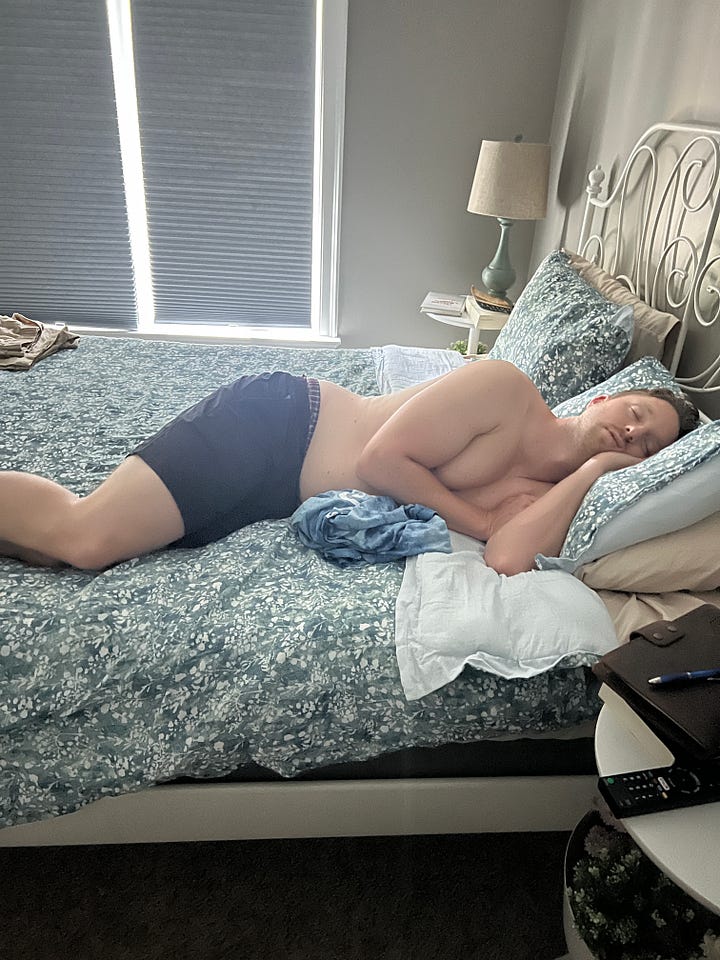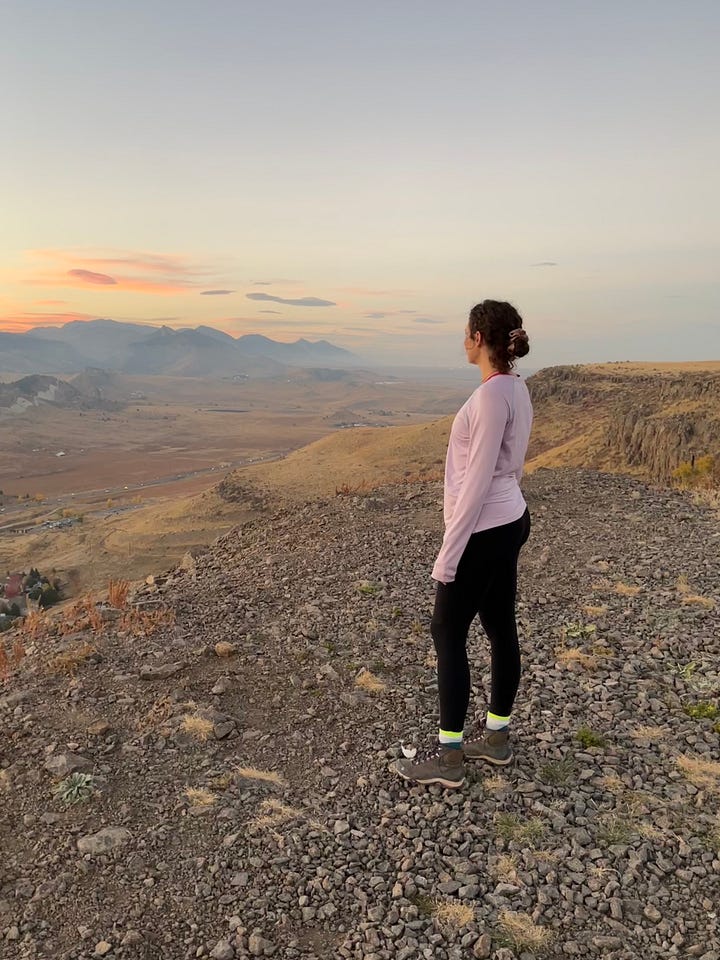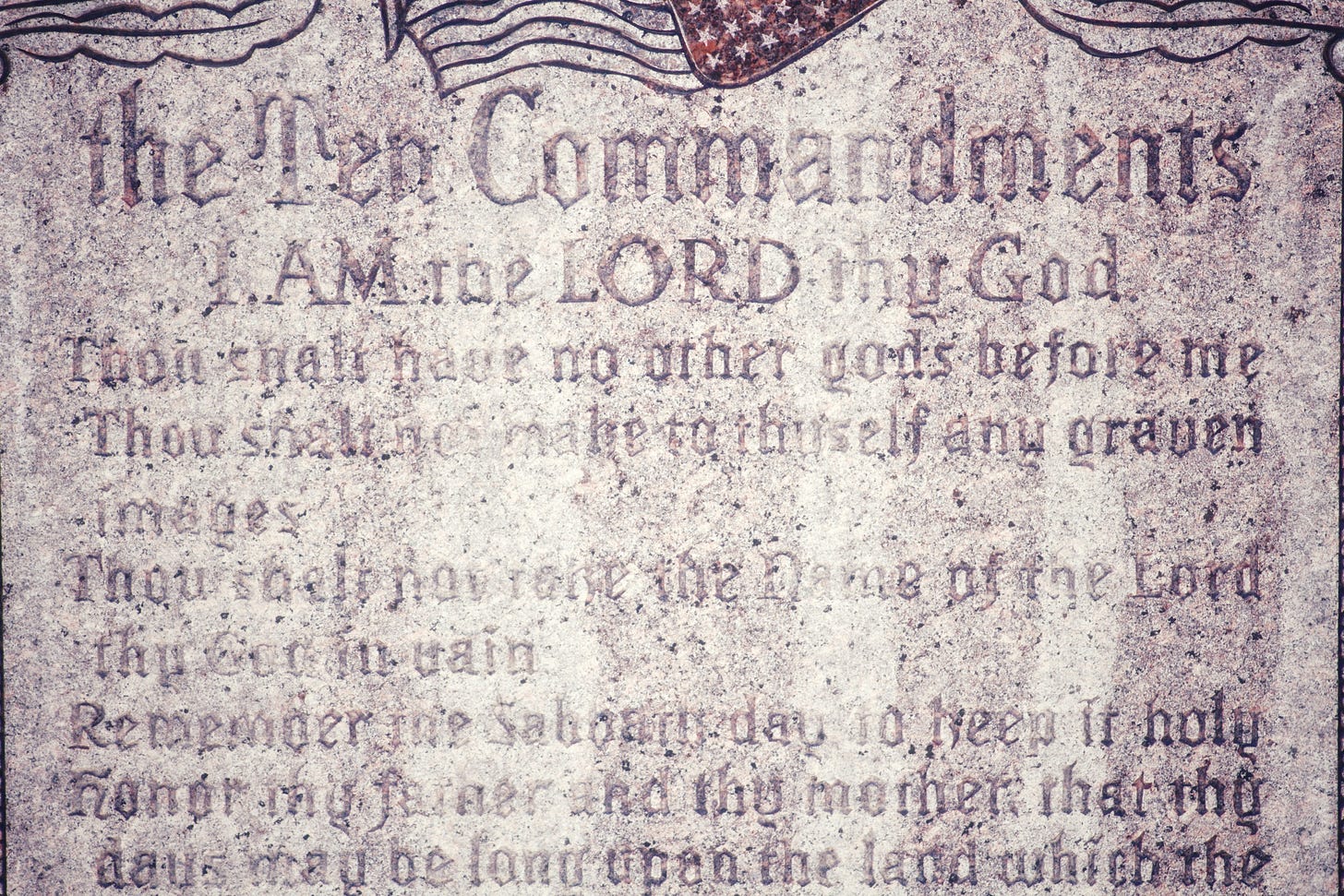Burned Out? This 1 Ancient Practice Can Rejuvenate Your Soul
It’s countercultural, but requires no work. It transformed my life for the better, and can help you too.
It took me about 25 years, but I finally found a cure for the Sunday Scaries.
Growing up, from about age 9 to age 23, I used to feel a massive sense of dread around 5 pm. A slight depression would hit me as I thought ahead to the upcoming Monday, whether I was going back to school as a student or a teacher.
I wasn’t alone.
75% of Americans get the same feeling of dreading the upcoming week – the Sunday Scaries – according to a LinkedIn Survey.
So, what’s the cure?
It took me until about the age of 29, but I eventually found it – or it found me.
For me, the cure was and is an ancient practice God first did after He created the universe. The practice was gifted to His people, and engraved in the Ten Commandments alongside orders like “don’t murder” and “don’t steal.” Jesus reaffirmed the practice multiple times.
That practice is Sabbath – a complete day to stop all work and instead rest, delight, and worship.
Why Don’t We Sabbath?
Billions of people around the world profess faith to Judaism or Christianity, but just a small minority practice Sabbath.
Why?
In today’s connected world, it is extremely hard to disconnect. Something always demands our attention, whether it is our phones, computers, a late assignment at work, grocery shopping, meal prep, breaking news, etc.
Additionally, we buy into the lie that we are only as good as what we produce and consume, and therefore we continually strive even when our bodies and minds demand rest.
The Sabbath boldly and counterculturally confronts that lie.
The Sabbath literally tells us “to stop” (shabbat).
It tells us to put down our social media or whatever assignment is front of us, and instead delight in the earth God has created today.
Why Sabbath?
The Macro-level case for the Sabbath
There are numerous reasons to practice Sabbath. For those who are Christian or Jewish, God’s word commands it. For those who are secular, there is a strong scientific case for practicing Sabbath, although the heart of the Sabbath is in obedience to God.
On an overarching level, you should practice Sabbath because you will likely feel considerably better if you do. Sabbath has helped me a ton.
You are likely more tired and burned out than you realize. The best way to fight that burnout is to stop giving into the temptations that are causing it.
A full day of rest makes you feel outrageously good.
Do you really want to be checking email or scrolling social media, when you can be relaxing or doing things that awaken your soul, and rejuvenate your spirit?
Are you tired of every day feeling the same or your weekends not feeling restful? Then just take one day to completely rest.
Let’s dive into the scriptural and scientific cases for Sabbath.
The Scriptural Case for the Sabbath
For those who are Jewish or Christian, this part may resonate with you. But, I also encourage those who are agnostic, atheist or from other faith backgrounds to still consider this. The word “Sabbath appears” in the Bible 133 times, including 107 times in the Old Testament. Meanwhile “rest” appears a whopping 323 times.
Sabbath in the Old Testament
In the first chapter of the Bible, we learn that God created the universe, and then on the seventh day, when he was finished he did something interesting. He rested.
“By the seventh day God had finished the work he had been doing; so on the seventh day he rested from all his work. Then God blessed the seventh day and made it holy...” (Genesis 2:2-3 NIV)
In short, as musician Forrest Frank notes, “Even God takes breaks.”
Yes, God, the Creator of the Universe, in whom billions of people call upon and worship, rested. Therefore we too should rest.
Sabbath continues to be called for in the Old Testament.
That includes in the Ten Commandments.
It’s the longest of all the commandments. Longer than the commands to not murder nor steal. Here it is in brief:
“Remember the Sabbath day to keep it holy. Six days shalt thou labor, and do all thy work; but the seventh day is a sabbath unto Jehovah thy God; in it thou shalt not do any work…” (Exodus 20:8-10 ASV)
The passage goes onto encourage everyone to not work, including farm animals
The Old Testament continues to call for Sabbath in Leviticus, Deuteronomy, Numbers and other books.
Sabbath in the New Testament
Jesus taught his students that Sabbath is a gift, not a burden of rules to follow:
“The Sabbath was made for man, not man for the Sabbath.” (Mark 2:27-28).
Christ healed on the Sabbath, showing it was meant for renewal and joy (Luke 13:10-17).
Most Christians agree that rest is essential and that trusting in God matters more than endless striving. Jesus invites us: “Come to me, all you who are weary... and I will give you rest.” (Matthew 11:28).
Where Christians differ is whether the Sabbath command still applies.
Some believe it was part of the Old Covenant and fulfilled in Christ (Colossians 2:16-17).
Others see it as a lasting moral principle, shifting to Sunday (or a day the individual decides) as a day for worship and rest (Acts 20:7).
Regardless of approach, the heart of the Sabbath remains: God calls us to a rhythm of work and rest, trusting Him for renewal.
The Sabbath, and the pattern of six days of work and one day of total rest is ingrained into the very being of ourselves, others and the earth.
And as H.H Farmer notes, “If you go against the grain of the universe, you get splinters.”
The Scientific Case for the Sabbath
There is an emerging scientific basis for a complete day of rest. In this section, I’ll cite a few of those studies which directly and indirectly relate to Sabbath.
One particlarly notable example are the Seventh Day Adventists. This religious group, which observes Sabbath diligently and joyfully, lives on average six years longer than the general population (source). It’s important to note that the Seventh Day Adventists also have other customs that may contribute to their longer lifespan including a vegetarian diet.
Meanwhile the American Psychology Association and World Health Organization have found that consistent, structured rest significantly enhances mental, physical, and emotional health.
Additionally, numerous studies have found that working more than 40-50 hours per week sharply reduces productivity and health (source). And people that work 70 hours or no more productive than those that work around 40 hours (source).
Finally, a number of people are beginning to espouse the power of a “tech shabbat,” distancing themselves from their devices for a period of ~24 hours. Tiffany Shlain writes about this in her book 24/6. SoBrief, summarizes the author in that,
“We've retained the Puritans' Protestant work ethic, but not their commitment to an ironclad day off.”
Humans have inherent biological and psychological limits. Respecting these rhythms through structured rest significantly contributes to holistic well-being.
How to Practice Sabbath

My wife, a few friends, and I have been working through John Mark Comer’s Practicing the Way. Comer is a former pastor who burned himself out running a large church. He has found his groove as a writer and theologian, coaching others on the power of adopting ancient “spiritual disciplines” like Sabbath.
We’re a few sessions in to his organization’s teachings on Sabbath, and already, it’s shifting how we think about rest.
He, informed by his experience and other practitioners, breaks Sabbath down into four parts: stop, rest, delight and worship.
Stop
Comer notes that we live in a world that never stops—where worth is measured by output, and rest feels like laziness. But Sabbath invites us to step off of the hamster wheel and trust in God’s provision.
Rest:
Sabbath should be full of things that restore us, not worry us. Think sleeping in, walking, reading, napping, etc. There are lots of activities that are restful for you. It’s about finding what relaxes and restores you. But it shouldn’t mean errands, meal prep, social media, binge watching Netflix, etc.
Delight
Sabbath is about enjoying the world God has created. That can take on many different forms. Comer recommends pleasure stacking. A few ideas, which should ultimately be personal to you, he throws out are “make pancakes, open a good bottle of wine, have a dance party, play music, get coffee with your best friend, make love to your spouse.”
Dan Allender, author of Sabbath agrees that delight is critical to the Sabbath, calling the day, “a grateful celebration” and a “party.” For those of us who are extroverted, this sounds great. For those of us who are introverts, I would advise you to do what restores you. Some peace, quiet, and alone time or simply time with a partner or friend may be what is best for you.
Worship
Recognition of God is central to the Sabbath. Jesus stated that he is “Lord of the Sabbath.”
People worship in different ways. A simple way to worship is by attending church services. Dan Allender notes that church services should feel restorative to your soul. So attend a church or service that fills you up.
Some Sundays my wife and I volunteer at our church. This doesn’t feel like it’s against the Sabbath, but instead complements it.
How I Practice Sabbath


As mentioned, I’ve only started practicing Sabbath in the last few years. It has taken me time to figure out what I like doing on it, and what I don’t. Find out what works for you.
I try not to follow a strict schedule but instead, have a few things, that I’d like to do.
Sabbath for us starts in the days before. We try our best to get all of our shopping done in the days before or the day before.
I observe Sabbath on Sunday. I know others who observe it on Friday after work (sundown) to sundown to Saturday. Our pastor observes it on Monday since he works Sunday. Just find a day that works best for you.
My Sabbath day usually, but not always, involves:
Sleeping in
Attending church
Occasionally (about once a quarter) volunteering for 90 minutes or so
Spending time outside if the whether is decent – going for a walk, shooting hoops, sunbathing, etc
Journaling.
A couple Sabbaths ago, I was journaling, and the sun was blazing into my office, and I felt close to God. It was just a wonderful experience.
Reading (nothing related to work, but instead fiction, biographies, autobios). If it feels anything like work, I don’t read it.
Napping
It’s crazy how tired my body feels on Sunday. It’s like I need the extra rest.
Eating dessert, perhaps multiple times throughout the day : )
Last Sunday, Kerry made cinnamon roll pancakes. I had one at breakfast, and one after dinner. For the dessert one in my last few bites, I covered the entire thing in a layer of homemade cinnamon sugar frosting. It was the tastiest thing I has all week. I’m chuckling just thinking about it. I’m telling you the Sabbath is amazing.
Doing a Marraige Journal with my wife, Kerry.
We look at the upcoming week, talk about highs and lows of the past week, discuss any challenges we’re having and pray for each other. This has become a really nice way for us to callibrate with each other.
Making love with my spouse (TMI?)
Preparing a delicious dinner. I usually make this for Kerry, since she normally cooks throughout the week. I enjoy it.
Going to bed early, and sleeping deeply into Monday. Last Sabbath I went to bed around 9 pm and woke up around 8 am. It was wonderful.
Monday morning, I usually wake up feeling super rejuvenated. The Sabbath is like a weekly hard reset.
Just as important (or even more so) are the things I don’t do on the Sabbath. I usually don’t:
Use my phone and laptop
This is probably one of the most impactful things I do.
I put both away for pretty much the entire day most of the time on the Sabbath.
I do use my computer for about 5 minutes when my wife and I are doing our marraige journal so I can look at my calendar for the upcoming week.
Watch TV
This is a new one that we have started cutting out, and it feels pretty good so far.
I make some exceptions for big football games like Super Bowl Sunday or certain Broncos games.
I’m still figuring out how to balance my love for sports with the Sabbath, and am not totally clear on it at the moment.
Dan Allender, attends movies on the Sabbath with his family once a month, so I don’t feel this needs to be ruled out, if film or television are life-giving for you.
Next steps
Parhaps this as your sign to starting practicing Sabbath or go deeper with your current Sabbath practice.
If you feel like taking one day is too much, I would encourage you to start with just 3 to 4 hours, and then progress.
Sabbath is distinct from the secularized weekend, which Eugene Peterson calls the “bastard Sabbath” because it abandons our Holy Father.
I understand Sabbath is harder for new parents or people living under the yoke of poverty, who feel forced to work seven days a week, and in multiple jobs. It’s my prayer that you would still be able to find rest, and it would benefit you.
The Sabbath is amazing. It’s a gift God created for you and me to delight in him and the earth he created. Seize it. For it is yours!
Comment below – what do you think about the Sabbath? Do you currently practice it? How is it going? Do you want start practicing Sabbath? What is getting in your way?
If you want to connect with me on social media, you can using the links below:













Thanks for reading! Let's talk about Sabbath!